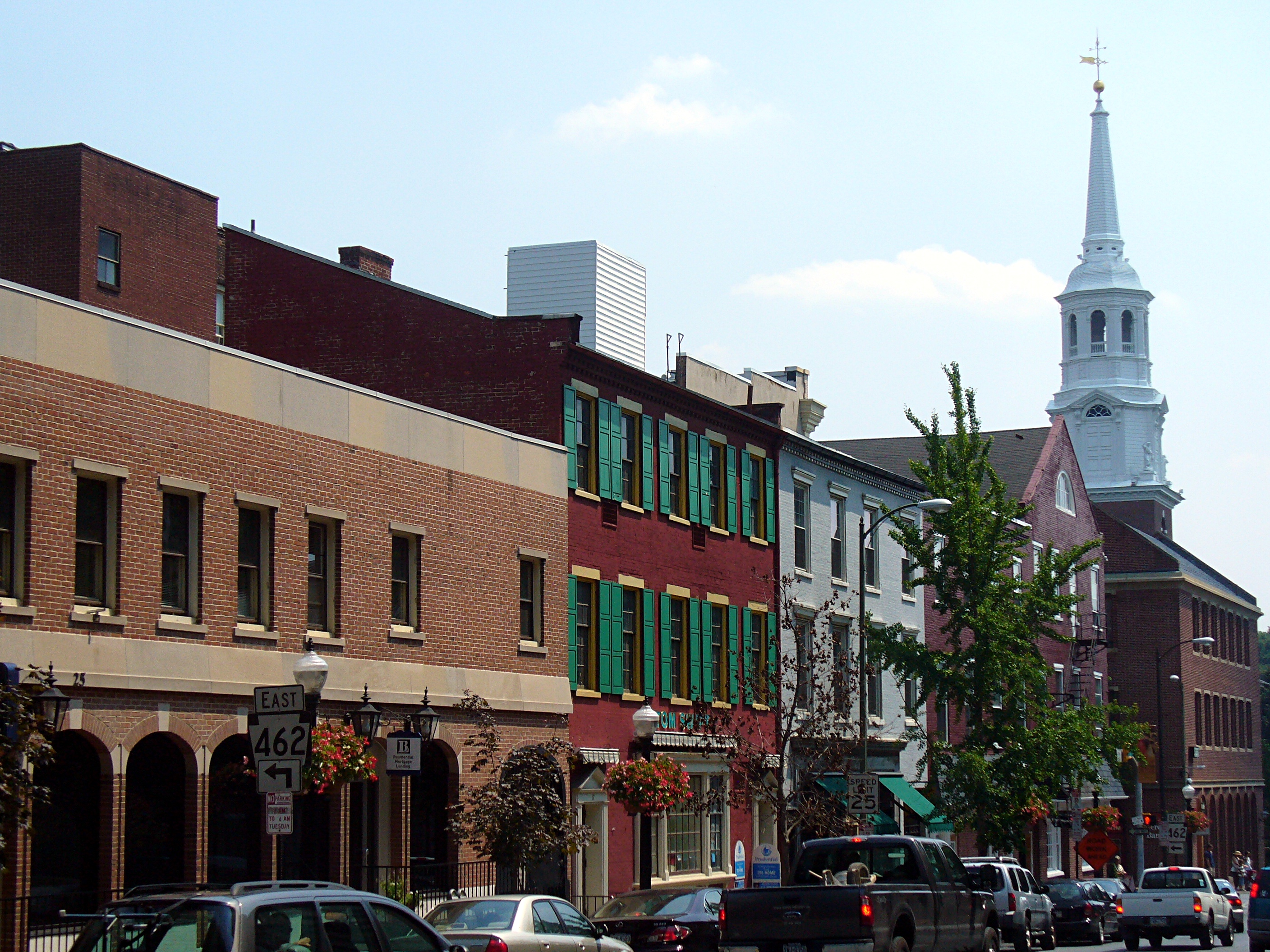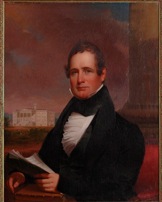|
John Strohm (congressman)
John Strohm (October 16, 1793 – September 12, 1884) was an American politician from Pennsylvania who served as a Whig member of the U.S. House of Representatives for Pennsylvania's 8th congressional district from 1845 to 1849. Early life John Strohm was born in the part of Little Britain Township which formed the current Fulton Township to David and Ann Herr Strohm. He was home-schooled by is mother and encouraged to read newspapers and books. When he was twelve, his family moved to Strasbugh Township where his parents had been raised. For the next four years, he worked on the family farm and attended school for only three to four months during the winter until he reached age 16. After completing school, he continued working on the farm until 1815, except for a three-month period in 1813 where he taught school. In the fall of 1815, at age 22, he again taught school. This time it was in West Lampeter Township from 1815 to 1821, after which he resumed farming. He moved ... [...More Info...] [...Related Items...] OR: [Wikipedia] [Google] [Baidu] |
Pennsylvania
Pennsylvania (; ( Pennsylvania Dutch: )), officially the Commonwealth of Pennsylvania, is a state spanning the Mid-Atlantic, Northeastern, Appalachian, and Great Lakes regions of the United States. It borders Delaware to its southeast, Maryland to its south, West Virginia to its southwest, Ohio to its west, Lake Erie and the Canadian province of Ontario to its northwest, New York to its north, and the Delaware River and New Jersey to its east. Pennsylvania is the fifth-most populous state in the nation with over 13 million residents as of 2020. It is the 33rd-largest state by area and ranks ninth among all states in population density. The southeastern Delaware Valley metropolitan area comprises and surrounds Philadelphia, the state's largest and nation's sixth most populous city. Another 2.37 million reside in Greater Pittsburgh in the southwest, centered around Pittsburgh, the state's second-largest and Western Pennsylvania's largest city. The state's su ... [...More Info...] [...Related Items...] OR: [Wikipedia] [Google] [Baidu] |
1852 Whig National Convention
The 1852 Whig National Convention was a presidential nominating convention held from June 17 to June 20, in Baltimore, Maryland. It nominated the Whig Party's candidates for president and vice president in the 1852 election. The convention selected General-in-Chief Winfield Scott (commanding the United States Army and led in the recent war with Mexico) for president and U.S. Secretary of the Navy William A. Graham for vice president. In the aftermath of the Mexican–American War (1846–1848) and the Compromise of 1850, the Whig Party was torn over the issue of slavery. President Millard Fillmore, who had succeeded to the presidency in July 1850 after the death of President Zachary Taylor, had the strong backing of Southern Whigs. However, his enforcement of the Fugitive Slave Act of 1850 had alienated many Northern Whigs, who supported either Scott or Secretary of State Daniel Webster. Scott and Fillmore essentially tied on the first presidential ballot, while a smaller fra ... [...More Info...] [...Related Items...] OR: [Wikipedia] [Google] [Baidu] |
Lancaster, Pennsylvania
Lancaster, ( ; pdc, Lengeschder) is a city in and the county seat of Lancaster County, Pennsylvania. It is one of the oldest inland cities in the United States. With a population at the 2020 census of 58,039, it ranks 11th in population among Pennsylvania's municipalities. The Lancaster metropolitan area population is 507,766, making it the 104th-largest metropolitan area in the U.S. and second-largest in the South Central Pennsylvania area. The city's primary industries include healthcare, tourism, public administration, manufacturing, and both professional and semi-professional services. Lancaster is a hub of Pennsylvania's Dutch Country. Lancaster is located southwest of Allentown and west of Philadelphia. History Originally called Hickory Town, the city was renamed after the English city of Lancaster by native John Wright. Its symbol, the red rose, is from the House of Lancaster. Lancaster was part of the 1681 Penn's Woods Charter of William Penn, and was laid ... [...More Info...] [...Related Items...] OR: [Wikipedia] [Google] [Baidu] |
Surveying
Surveying or land surveying is the technique, profession, art, and science of determining the terrestrial two-dimensional or three-dimensional positions of points and the distances and angles between them. A land surveying professional is called a land surveyor. These points are usually on the surface of the Earth, and they are often used to establish maps and boundaries for ownership, locations, such as the designed positions of structural components for construction or the surface location of subsurface features, or other purposes required by government or civil law, such as property sales. Surveyors work with elements of geodesy, geometry, trigonometry, regression analysis, physics, engineering, metrology, programming languages, and the law. They use equipment, such as total stations, robotic total stations, theodolites, GNSS receivers, retroreflectors, 3D scanners, LiDAR sensors, radios, inclinometer, handheld tablets, optical and digital levels, subsurface locators, d ... [...More Info...] [...Related Items...] OR: [Wikipedia] [Google] [Baidu] |
Abolitionism
Abolitionism, or the abolitionist movement, is the movement to end slavery. In Western Europe and the Americas, abolitionism was a historic movement that sought to end the Atlantic slave trade and liberate the enslaved people. The British abolitionist movement started in the late 18th century when English and American Quakers began to question the morality of slavery. James Oglethorpe was among the first to articulate the Enlightenment case against slavery, banning it in the Province of Georgia on humanitarian grounds, and arguing against it in Parliament, and eventually encouraging his friends Granville Sharp and Hannah More to vigorously pursue the cause. Soon after Oglethorpe's death in 1785, Sharp and More united with William Wilberforce and others in forming the Clapham Sect. The Somersett case in 1772, in which a fugitive slave was freed with the judgement that slavery did not exist under English common law, helped launch the British movement to abolish slavery. T ... [...More Info...] [...Related Items...] OR: [Wikipedia] [Google] [Baidu] |
Washington, DC
) , image_skyline = , image_caption = Clockwise from top left: the Washington Monument and Lincoln Memorial on the National Mall, United States Capitol, Logan Circle, Jefferson Memorial, White House, Adams Morgan, National Cathedral , image_flag = Flag of the District of Columbia.svg , image_seal = Seal of the District of Columbia.svg , nickname = D.C., The District , image_map = , map_caption = Interactive map of Washington, D.C. , coordinates = , subdivision_type = Country , subdivision_name = , established_title = Residence Act , established_date = 1790 , named_for = George Washington, Christopher Columbus , established_title1 = Organized , established_date1 = 1801 , established_title2 = Consolidated , established_date2 = 1871 , established_title3 = Home Rule Ac ... [...More Info...] [...Related Items...] OR: [Wikipedia] [Google] [Baidu] |
Abraham Lincoln
Abraham Lincoln ( ; February 12, 1809 – April 15, 1865) was an American lawyer, politician, and statesman who served as the 16th president of the United States from 1861 until his assassination in 1865. Lincoln led the nation through the American Civil War and succeeded in preserving the Union, abolishing slavery, bolstering the federal government, and modernizing the U.S. economy. Lincoln was born into poverty in a log cabin in Kentucky and was raised on the frontier, primarily in Indiana. He was self-educated and became a lawyer, Whig Party leader, Illinois state legislator, and U.S. Congressman from Illinois. In 1849, he returned to his successful law practice in central Illinois. In 1854, he was angered by the Kansas–Nebraska Act, which opened the territories to slavery, and he re-entered politics. He soon became a leader of the new Republican Party. He reached a national audience in the 1858 Senate campaign debates against Stephen A. Douglas. ... [...More Info...] [...Related Items...] OR: [Wikipedia] [Google] [Baidu] |
William Bigler
William Bigler (January 1, 1814August 9, 1880) was an American politician from Pennsylvania who served as a Democrat as the 12th Governor of Pennsylvania from 1852 to 1855 and as a member of the United States Senate for Pennsylvania from 1856 to 1861. His older brother, John Bigler, was elected governor of California during the same period. As of 2022, he is the last Democratic incumbent to lose reelection as Governor of Pennsylvania. Early life and education Bigler was born in Sherman Valley, Pennsylvania, to Jacob and Susan Dock Bigler. He attended public schools and worked as a printer's apprentice, a journalist and as a member of the staff of the ''Centre County Democrat'' newspaper under his elder brother John Bigler who later became the governor of California. Career In 1833, at the urging of his friends, including future Pennsylvania Governor Andrew Curtin, Bigler founded his own political newspaper, the ''Clearfield Democrat'' which supported Jacksonian democracy. I ... [...More Info...] [...Related Items...] OR: [Wikipedia] [Google] [Baidu] |
Ebeneezer Kingsbury
Ebenezer may refer to: Bible * Eben-Ezer, a place mentioned in the Books of Samuel People * Ebenezer (given name), a male given name Places Australia * Ebenezer, New South Wales * Ebenezer, Queensland, a locality in the City of Ipswich * Ebenezer, South Australia Canada * Ebenezer, Prince Edward Island, a historic place in Queens County, Prince Edward Island * Ebenezer, Saskatchewan United States * Ebenezer, Georgia * Ebenezer, Muhlenberg County, Kentucky * Ebenezer, Mississippi * Ebenezer, Missouri * Ebenezer, New York * Ebenezer, Ohio * Ebenezer, Pennsylvania * Ebenezer, Camp County, Texas * Ebenezer, Jasper County, Texas * Ebenezer, Virginia * Ebenezer, Wisconsin Other uses * ''Ebenezer'' (film), a 1997 Canadian television film * ''Ebenezer'' (hymn), a Welsh tune to which many hymns are set See also * Ebenezer Church (other) * Ebenezer Colonies, New York * Ebenhaeser, South Africa * New Ebenezer, New York * Ebenezer Floppen Slopper's Wonderful Water slides, a ... [...More Info...] [...Related Items...] OR: [Wikipedia] [Google] [Baidu] |
Buckshot War
The Buckshot War was the outbreak of unrest in Harrisburg, Pennsylvania that transpired after the Pennsylvania gubernatorial and legislative elections in 1838 when both the Whig and Democratic parties claimed control over the Pennsylvania House of Representatives. The election of 1838 After being elected governor of Pennsylvania in 1835, Anti-Masonic and Whig candidate Joseph Ritner served a successful term. With the cooperation of his unofficial advisor Thaddeus Stevens and Secretary of Commonwealth Thomas H. Burrows, Ritner used Public Works as an instrument of political patronage, providing thousands of jobs. Thus it came as a shock to Whigs and Anti-Masons that Ritner was defeated for re-election by the Democratic Party candidate David Rittenhouse Porter. The campaign was considered very bitter, with Porter winning by a slim majority of 5,496 in a total vote of 250,146. This election was significant in regards to financial patronage as, if the sitting governor and his ... [...More Info...] [...Related Items...] OR: [Wikipedia] [Google] [Baidu] |
Thaddeus Stevens
Thaddeus Stevens (April 4, 1792August 11, 1868) was a member of the United States House of Representatives from Pennsylvania, one of the leaders of the Radical Republican faction of the Republican Party during the 1860s. A fierce opponent of slavery and discrimination against black Americans, Stevens sought to secure their rights during Reconstruction, leading the opposition to U.S. President Andrew Johnson. As chairman of the House Ways and Means Committee during the American Civil War, he played a leading role, focusing his attention on defeating the Confederacy, financing the war with new taxes and borrowing, crushing the power of slave owners, ending slavery, and securing equal rights for the freedmen. Stevens was born in rural Vermont, in poverty, and with a club foot, which left him with a permanent limp. He moved to Pennsylvania as a young man and quickly became a successful lawyer in Gettysburg. He interested himself in municipal affairs and then in politics. He was elec ... [...More Info...] [...Related Items...] OR: [Wikipedia] [Google] [Baidu] |

_crop.jpg)
.jpg)

